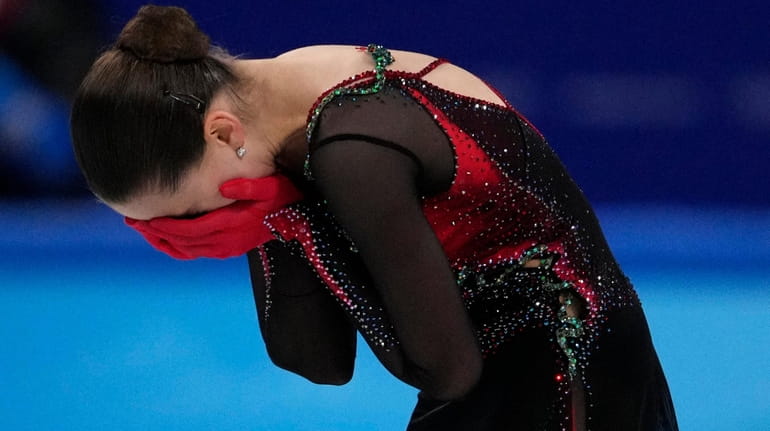An Olympic lesson in how to be tough

Kamila Valieva, of the Russian Olympic Committee, reacts after the women's free skate program during the figure skating competition at the 2022 Winter Olympics, Thursday, in Beijing. Credit: AP/Bernat Armangue
It's never a good look for any Olympic Games when — after thousands of athletes from dozens of nations have competed in scores of events chasing gold, silver, and bronze — the signature moment is the emotional destruction of a 15-year-old girl.
Russian figure skater Kamila Valieva's performance in the long program of the women's figure skating final was stunningly short of what was expected, to be sure. Justifiably heralded as the sport's next star and possessed with grace, presence and a preternatural ability for quad jumps, she slipped, wobbled, and outright fell all over the ice. It was shocking, even given her look of uncertainty as the music started, but athletes have succumbed under pressure before.
What followed was without precedent.
On the verge of a breakdown as she skated off the ice, Valieva was met by coach Eteri Tutberidze, who at that moment of extreme vulnerability for her shattered pupil chose interrogation over empathy.
"Why did you stop fighting?" Tutberidze demanded. "Explain it to me, why?"
Shortly after, Valieva dissolved into tears, and two 17-year-old training mates — Anna Shcherbakova and Alexandra Trusova, elevated by Valieva's collapse to gold and silver, respectively —careened between tears, stoicism, bewilderment, anger, and shock, a Grand Guignol playing out in real time with intrusive TV cameras locked on their faces.
Public grief makes for good ratings, but rarely it is helpful to those grieving.
Parents of young athletes understand what Valieva was feeling. They know how difficult it can be for their children to deal with an unexpected loss — both their own and that of a teammate.
Tutberidze, the coach, didn't seem to care. Her insistence on an explanation before anything else felt cold and callous. But there is indeed some explaining to do — mostly by the adults in Valieva's life.
The teen had been under unfathomable pressure forged by expectations and innuendo, mostly from the drug test she failed in December, revealed only after The Games had started. The drug was a heart medication, one of three in her system (the other two were not banned substances). It's unlikely taking the illegal drug was Valieva's idea. So Tutberidze herself owes an explanation. The same Tutberidze whose harsh training methods have long been known to produce stars or discards. Either you get the gold or you crash out, hobbled by severe injuries or suffering from an eating disorder.
America has no high road to claim here. Our athletic history also is riddled with, for example, gymnasts forced into similar crucibles of torture. On our TVs, we only saw those who thrived.
The Court of Arbitration for Sport has some explaining to do. It allowed Valieva to skate despite her drug test, saying that denying her the right to compete might cause her "irreparable harm." And irreparable harm is what Valieva has now experienced. And, more scarily, what she might continue to endure in the future.
Valieva skated that night knowing that countless people, including many fellow competitors, didn't think she should be there. But she was expected to tough it out.
But when does tough become too tough? We love all those cliches about toughness — only the strong survive, tough times never last but tough people do, what doesn't kill you makes you stronger — but sometimes toughness can be destructive.
Twenty years ago, I covered the Winter Olympics in Salt Lake City when another figure-skating favorite, American Michelle Kwan, had a poor long program and was passed for gold by Long Island's Sarah Hughes. Kwan, too, was suffering afterward. She, too, was in tears, watching Hughes bask in the applause that had long been hers. But during the medal ceremony, when Hughes turned to the medal stand and hesitated, unsure of where to go, it was the bronze-medalist Kwan who waved her right hand and showed Hughes the way.
There are all kinds of toughness. Only some should be celebrated.
Columnist Michael Dobie's opinions are his own.

